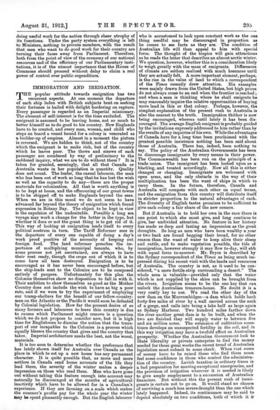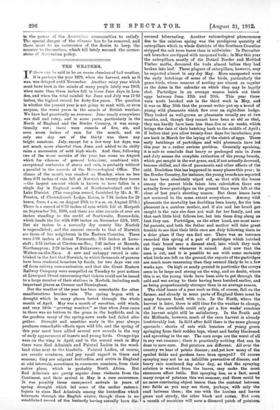IMMIGRATION AND IRRIGATION. T HE popular attitude towards emigration has two
recurrent aspects. At one moment the departure of each ship laden with British subjects bent on seeking their fortunes is hailed with delight bordering on rapture. Every passenger is regarded as an Imperial missionary. The element of self-interest is for the time excluded. The emigrant is assumed to be leaving home, not so much to better himself as to do good to his country. New Englands have to be created, and every man, woman, and child who steps on board a vessel bound for a colony is venerated as a builder-up of empires. Almost in a moment the picture is reversed. We are bidden to think, not of the country which the emigrant is to make rich, but of the country which he leaves poor. The thews and sinews of each passenger are numbered by way of preliminary to the saddened inquiry, what we are to do without them'? It is taken for granted, seemingly, that all that Canada or Australia wants in her population is quantity. Quality does not count. The loafer, the casual labourer, the man who has been out of work so long that he has lost the wish as well as the capacity to do any—these are the proper materials for colonization. All that is worth anything is to be kept at home, and the offscouring of our great towns is to be shipped off to make Englands beyond the seas. When we are in this mood we do not seem to have advanced far beyond the theory of emigration which found expression in Botany Bay. The object to be kept in view is the expulsion of the undesirable. Possibly a long sea voyage may work a change for the better in the type, but whether it does or not the great thing is to get rid of it. This way of looking at emigration lends itself to every political nostrum in turn. The Tariff Reformer sees in the departure of every one capable of doing a day's work proof positive of the necessity of keeping out foreign food. The land reformer preaches the im- portance of multiplying municipal tenants, who, by some process not yet ascertained, are always to have their rent ready, though the crops out of which it is to come have all been destroyed. Emigration is to be encouraged as it has never been encouraged before, but the ship-loads sent to the Colonies are to be composed entirely of paupers. Unfortunately for this plan the Colonies themselves show no disposition to fall in with it. Their ambition to show themselves as good as the Mother Country does not include the wish to have as big a poor rate, and if we were to try the experiment of employing our tramp-shelters for the benefit of our fellow-country- men on the Atlantic or the Pacific it would soon be defeated by Colonial legislation. How far the present desire of so many farmers and labourers to leave this country is due to causes which Parliament might remove is a question -which we do not propose to consider now, but it is high time for Englishmen to dismiss the notion that the trans- port of our incapables to the Colonies is a process which equally blesses the country that gives and the country that takes. Imperial architecture needs the best, not the worst, materials.
It is too soon to determine whether the preference that has lately shown itself for Australia over Canada as the place in which to set up a new home has any permanent character. It is quite possible that, as more and more settlers in Canada send home accounts of the life they lead there, the severity of the winter makes a deeper impression on those who read them. Men who have gone out without taking this feature enough into account may naturally be discouraged at the months of agricultural inactivity which have to be allowed for in a Canadian's experience. If they are farming on a scale which makes the summer's profits pay for the whole year the winter nay be spent pleasantly enough. But the English labourer who is accustomed to look upon constant work as the one thing needful may be discouraged in proportion as he comes to see facts as they are. The condition of Australian life will then appeal to him with special force. The thought of the tropics will gain attractions as he reads the letter that describes an almost arctic winter. We question, however, whether this is a consideration likely to weigh greatly with the mass of emigrants. Differences of climate are seldom realized with much keenness until they are actually felt. A more important element, perhaps, is the rise in the value of land to which a correspondent of the Times recently drew attention. His examples were mainly drawn from the United States, but high prices do not always come to an end when the frontier is reached ; and when a. man is thinking where he shall emigrate he may reasonably inquire the relative opportunities of buying more land in this or that colony. Perhaps, however, the simplest explanation of the present rush to Australia is also the nearest to the truth. Immigration thither is now being encouraged, whereas until lately it has been dis- couraged. The average English emigrant is probably guided by the invitations expressly addressed to him rather than by the results of any inquiries of his own. -While the advantages of Canada have for a long time been proclaimed with the greatest possible insistence nothing has been said about those of Australia. There has, indeed, been nothing to say. The policy of the Australian Governments has been to discourage immigrants by every means in their power. The Commonwealth has been run on the principle of a. trade union. The immigrant has been looked upon as a blackleg, and treated accordingly. Now all this is either changed or changing. Immigrants are welcomed with open arms, and the only obstacle in the way of their multiplication has been the want of ships in which to carry them. In the future, therefore, Canada and Australia will compete with each other on equal terms, and the emigration from this country will distribute itself in stricter proportion to the natural advantages of each. The diversity of English tastes promises to be sufficient to give each colony a fair share of the new comers.
But if Australia is to hold her own in the race there is one point to which she must give, and long continue to give, her undivided attention. No feature in her history has made so deep and lasting an impression as the great droughts. So long as men who have been wealthy a year or two back are found begging their bread, for no other reason than the want of water to keep alive their sheep and cattle, and to make vegetation possible, the tide of immigration, however strongly it may flow to-day, will ebb with equal force to-morrow. Mr. Bryce is described by the Sydney correspondent of the Times as being much im- pressed during his recent visit with the lands and resources of Australia. The country is not, as it used to be con- sidered, " a mere fertile strip surrounding a desert." The -whole area is valuable—provided only that the water which is not supplied by the skies can be brought from the rivers. Irrigation seems to be the one key that can unlock the Australian treasure-house. No doubt it is a very costly key to use. We read the other day of the new dam on the Murrumbidgee—a dam which holds back forty-five miles of river by a wall carried across the neck of a gorge, and calls into being a lake half as large again as Sydney Harbour. Two hundred miles farther down the river another great dam is to be built, and when the two are finished they will supply water to between five and six million acres. The extension of cultivation some- times develops an unsuspected fertility in the soil, and in this way irrigation may have a twofold effect on Australian prosperity. Whether the Australian Government look to State liberality or private enterprise to find the money needed for these great works the recent trend of Australian legislation must submit to some check. When vast sums of money have to be raised those who find them must feel some confidence in those who control the administra- tion of the country. Lavish taxation in ordinary times is a bad preparation for meeting exceptional emergencies, and the provision of irrigation wherever it is needed is likely to give ample employment to a succession of Australian financiers. But without this the present rush of immi- grants is certain not to go on. It would stand no chance of surviving a much less severe drought than the one which lately happened. Indeed, its continuance may be said to depend absolutely on two conditions, both of which it it
in the power of the Australian communities to satisfy. The special danger of the climate has to be removed, and there must be no recurrence of the desire to keep the country to themselves, which till lately seemed the corner- stone of Australian policy.



































 Previous page
Previous page